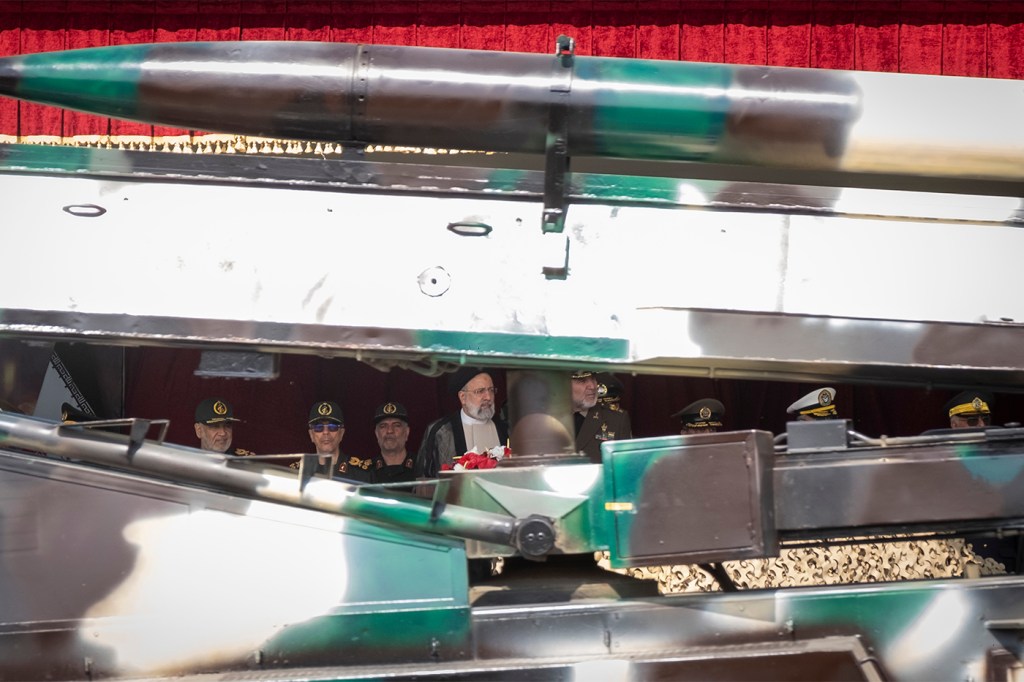The whole world would lose in a full-blown war between Israel and Iran, Northeastern expert says after latest escalation
Pablo Calderon Martinez, an associate professor in politics and international relations at Northeastern, says it’s not Israel or Iran’s style to opt for “outright war.”

LONDON — Tensions between Israel and Iran ratched-up further overnight on Friday with Tel Aviv reportedly using drones and possibly a missile to attack Tehran.
The BBC, citing U.S. officials, said Israel had fired a missile into Iranian territory while Iran claimed its troops defended against an Israeli drone attack that targeted air defenses at a major air base and a nuclear site near the central city of Isfahan.
The assault is being seen as a retaliation for Tehran’s unprecedented drone-and-missile assault on Israel last week.
Since the news broke, Western leaders have clamored for a de-escalation in the fragile region, with fears over a wider conflict erupting in the Middle East.
Who would win in a conflict between Iran and Israel? Nobody. The whole world would lose.
Pablo Calderon Martinez, an associate professor in politics and international relations at Northeastern’s London campus
A Northeastern University expert has predicted that an “outright war” between rivals Tel Aviv and Tehran is unlikely due to its no-win outcome for both sides.
Pablo Calderon Martinez, an associate professor in politics and international relations based in London, said a wider conflict would likely leave hundreds of thousands of people dead.
While a wider conflict between Iran and Israel could not be ruled out, Martinez said it would be the result “of a severe miscalculation.”
“Who would win in a conflict between Iran and Israel? Nobody. The whole world would lose,” he said. “Israel has nuclear capabilities. We don’t think Iran has nuclear capabilities in terms of long-range nuclear missiles, but that does not mean they do not have the capacity to develop something like a dirty bomb.
“And that could create serious damage around Israel, so I don’t think we’re going to see that escalation,” Martinez continued. “Why? Because it is the basic principle of math — everybody would lose.
“We are looking at potentially hundreds of thousands of casualties, so I don’t think it will escalate to that level.”
Hossein Dabbagh, an assistant professor in applied ethics at Northeastern, believes people in Iran are “terrified” about the future and are suffering “psychological trauma” about the damage and pain that a potential war could bring.
Dabbagh left Iran in 2010 to pursue his studies and career, but is still in daily contact with family and friends living under the authoritarian regime.
“When I heard the news, it was terrifying,” he said. “It was disturbing to think of my family, friends and community, that the conflict is now unraveling and that there might be some further consequences for the whole region, and particularly for Iran.”
“But those who are engaged with Iranian politics, with Middle East politics generally, we knew that this was coming. You could guess that this would happen some day.”
While the current conflict is, apart from a host of proxy battles, the first time Israel and Iran have squared up directly to each other, Dabbagh said the Islamic revolution in Iran in the late 1970s had put his country on a collision path.
“The whole constitution is built, designed and based on not recognising as Israel having a right to exist — they wanted from the beginning to have that kind of war or conflict with Israel directly and that is what is happening,” he added.
Friday’s strike is the latest development in the conflict between the two Middle East nations.
Editor’s Picks
Iran launched a strike on Israel Saturday, deploying more than 300 drones and missiles at the country as part of a large-scale aerial attack.
Tehran’s response was an apparent response to an attack by Israel on an Iranian complex in Damascus, Syria, earlier this month.
The attacks come against the backdrop of the Israel-Hamas war, which was sparked by the Palestinian militant group’s deadly raids on Israel on Oct. 7.
In response, Israel has led an intense campaign against Hamas — a group that is known to have Iranian support — deploying bombs and other military incursions on the Gaza Strip in the name of eradicating the territory’s rulers.
Hamas has claimed that more 30,000 Palestinians have died in the six months since the war started.
During a press conference after a G7 meeting in Italy on Friday, U.S. Secretary of State Antony Blinken avoided questions about the reported strike on Iran but confirmed Washington “has not been involved in any offensive operations” in the region.
The U.K., China, Egypt and Turkey have all called for calm following the latest events.
Martinez said these diplomatic messages are likely to also be relayed through back channels to Tel Aviv.
“While Western allies are incredibly supportive of Israel, I do think behind the scenes, there will be calls to show restraint,” he said.
Martinez suggested that Israeli Prime Minister Benjamin Netanyahu may have been playing to his domestic audience by choosing to exercise its military might and that he may have “felt they had to retaliate” after Iran’s attack six days ago.
But he argues that an out-and-out war is not the style of either country, with the two having been engaged in proxy squirmishes for decades, including via Iran-backed groups like Hamas and Hezbollah in Lebanon.
“From a strategic perspective, I think Iran sees this as an opportunity to rack up a win by poking Israel, by escalating the conflict … to just add a little bit of fuel to this fire and see what happens, because that is what they do,” Martinez said.
“That is a little bit of an unknown quantity here, a little bit of chaos. But is it escalating to a full-blown conflict? I doubt it,” he said. “It is not Iran’s style — it is not Israel’s style either. I think we are pretty much used to the idea of proxy wars.
“They will probably fight each other in some other proxy conflict somewhere else, be it Lebanon, Palestine, Yemen, you name it,” he continued. “In recent history, they don’t go for outright conflict, for outright war, and I would doubt if they did that this time around.”
Dabbagh said any solution to the conflict must understand the “religious difference” involved, with there being an authoritarian Islamic state on one side and a democratic but autocratic Jewish state on the other.
“It shows that we need a dialogue of religious faith here to understand the different cultures, coming from different religions,” he said.
The philosopher argues that, while the military clashes are not good for the wellbeing of the Iranian or Jewish people, the past is littered with examples of conflict resulting in peace talks.
He said: “History shows that when two hot-headed states, when they have a conflict or war, in the long-term perhaps they need to make a dialogue together.
“There are lots of examples that we have, from the Camp David Accords between Egypt and Israel, from the Good Friday Agreement in Northern Ireland, that after a long, prolonged conflict, they come to that place where they say, ‘Let’s have a peace negotiation’.
“I know some might say, ‘But look at the destruction, look at the cost of human suffering’. And that is definitely important — we should not ignore that.
“But from a long-term perspective, there might be a positive side to this, that these regimes, particularly these two religious states, that they understand, in the end, the solution is negotiation, that they need to start a peace process.”











